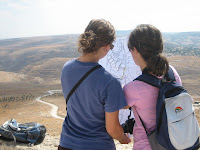
(Today we finished our “Approaches to Jerusalem” field study, taking a new route into the West Bank and keeping our eyes open for flying rocks. Thankfully, this trip was much less harrowing than the last.)
What do you think of when you picture a shepherd? A turbaned man reclining in the shade, playing a harp as his sheep quietly graze in the lush grass around him? That image was shattered as we surveyed the landscape. The Wilderness is chalky, rocky limestone unable to support any substantial plant life, save for a few prickly salt bushes. It stretches for miles, and the rugged paths cut through it often lead off steep cliffs. In the summer, the there is no refuge from the scorching heat. In the winter, flash floods are common in the deep wadis, or ravines. Drowning is the number one cause of death in the wilderness.
Shepherds live Bedouin-like lives. In the dry summer season, their sheep can graze in uncultivated farmers’ fields near the village. However, in the wet winter season (when farmers plant their crops), the shepherds take their flocks out into the wilderness for months at a time. Usually, the youngest son was given this dangerous, lonely job. They quickly had to learn survival skills, responsibility, and leadership. David grew up as a shepherd in the wilderness, experiencing all of this. He probably ate prickly salt bushes and lizards, killed lions and bears, escaped the raging waters of flash floods, wandered to the edge of steep cliffs, felt extreme thirst, and went months without seeing another human.

In light of these circumstances, Psalm 23 takes on a whole new meaning. David uses imagery from his every-day life. The Lord is the Shepherd; we are the sheep. David shows his longing for green pastures, still waters, paths of righteousness, and a time when he “will not want,” perhaps in anticipation of what He knows the Lord can provide someday—if not in his lifetime, then in heaven. In the middle of his psalm he accurately and quit literally describes his surroundings as “the valley of the shadow of death,” but then affirms that he “will fear no evil, for you are with me.” Again, he anticipates the Lord preparing him a table, anointing his head, and overflowing his cup. “Surely goodness and mercy will follow me all the days of my life, and I shall dwell in the house of the Lord forever.” The Hebrew word translated “mercy” here is hassed, and speaks of God’s covenantal, unchanging love for us. David trusted in God’s unconditional loving-kindness even in the face loneliness, hunger, thirst, and danger. We, also, can find comfort in God’s faithfulness as we face the difficulties of life.
Although I will never face the same hardships David did, I want to have his same attitude of hope and trust in the Lord.


No comments:
Post a Comment